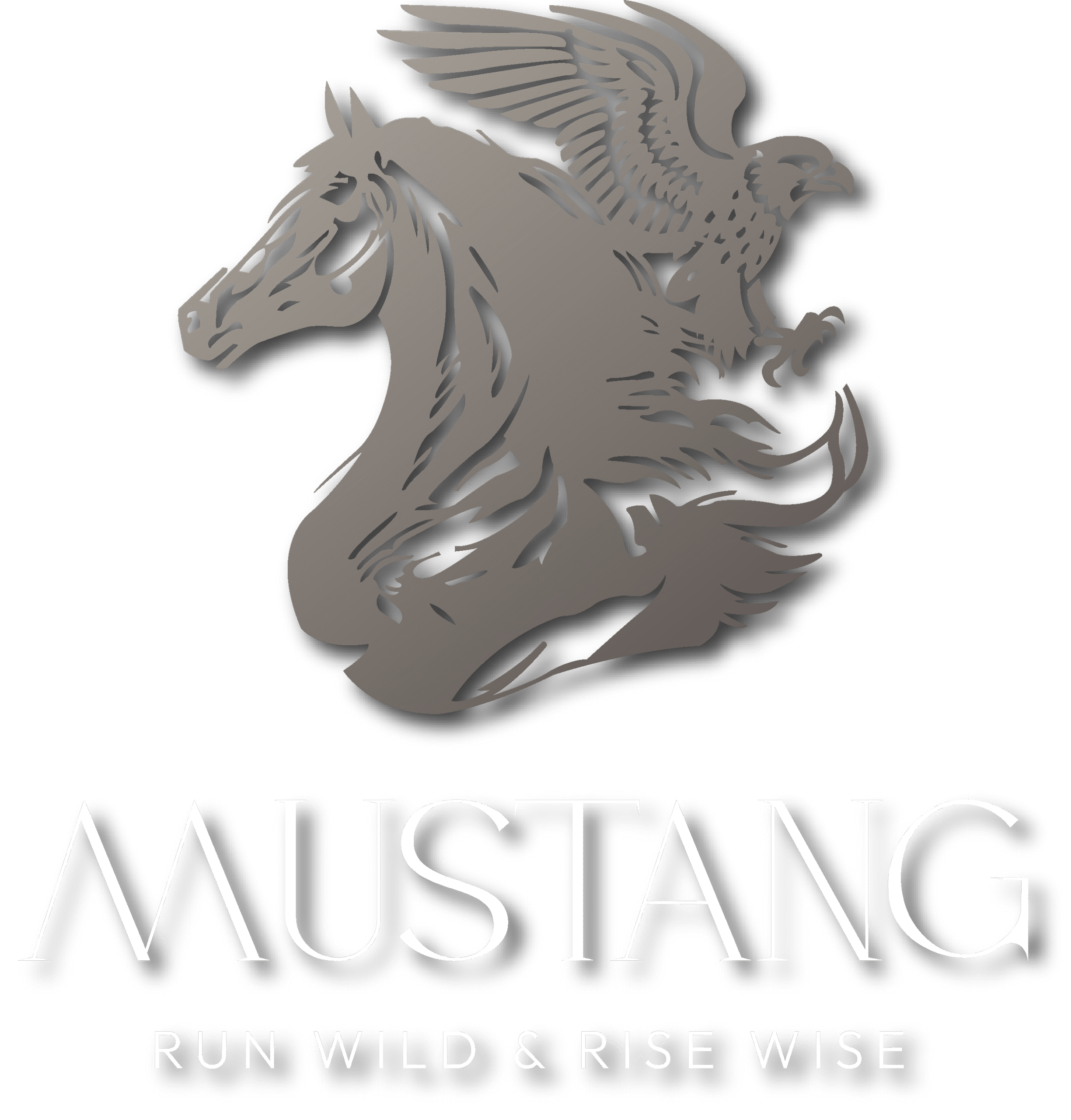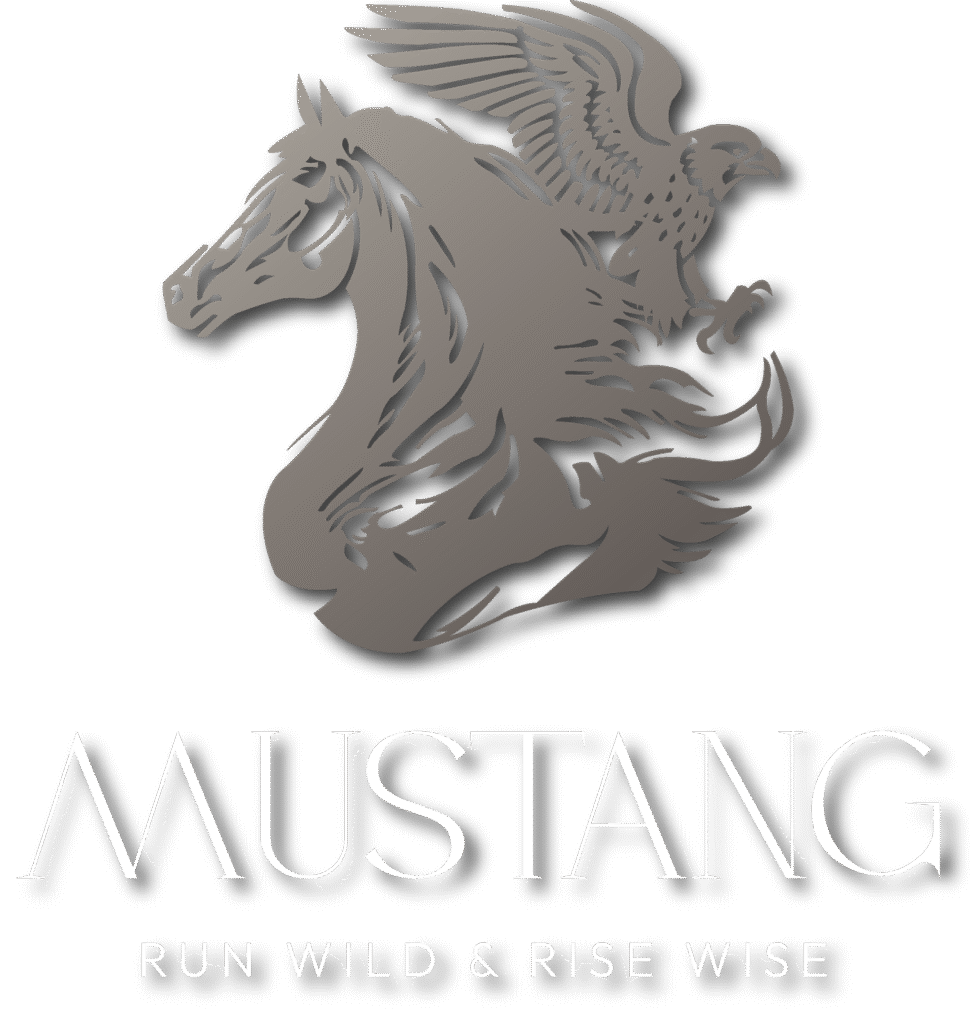About Us
OUR STORY:
The name Mustang comes from the Spanish mestengo, meaning a wild, untamed horse, a symbol of resilience, spirit, and endurance.
For Ghazanfar, the Mustang represented the eternal paradox of human potential: untamed energy seeking purpose, a memory from his cadet days.
For Colonel Akmal, it was the human spirit under command: a wild force that finds freedom only when guided by resilience & responsibility, a soldier’s recognition of the battlefield of emotions.
Mustang became the meeting point of their two visions:
- Ghazanfar saw wild ambition needing focus.
- Colonel Akmal saw discipline needing freedom & passion.
The philosophy is “Wild Horse, But Tamed” because it’s not about breaking the spirit, but about channelling it. Like raw talent, human potential is powerful but chaotic if unmanaged. When guided by the right techniques (like emotional
intelligence and mindset training), that chaos transforms into unstoppable excellence.
BACKGROUND
Col R Muhammad Akmal Khan
Ex Commandant & Selector
Inter Services Selection Board (ISSB), Pakistan Armed Forces
Profile Summary:
A seasoned military leader, assessor, and strategist with decades of experience shaping the psychological, emotional, and leadership profiles of Pakistan’s future officers. Known for his rare ability to decode human behaviour under pressure and turn emotional turbulence into structured clarity, he has mentored thousands of cadets, corporate leaders, and young professionals across Pakistan.
Core Attributes:
- Brings discipline, resilience, and a framework that transforms fear into fuel.
- Expert in emotional mastery, behavioral decoding, and leadership under adversity.
- His perspective is the Falcon’s eye, the ability to see patterns, vulnerabilities, and potential from above, giving direction to the wild energies of the Mustang philosophy.
Keynote Speaker & Seminar Footprint:
Colonel Muhammad Akmal Khan S.I. (M.) has been a prominent keynote speaker, delivering high-impact sessions at: SAARC Committee, Fatima Jinnah Women University, Lahore College for Women University (LCWU), National College of Arts (NCA), NRSP, SZABIST,
FAST University, Allama Iqbal Open University (AIOU), Preston University, Air University, Karachi University, All Cadet Colleges across all provinces (Punjab, Sindh, KP, Balochistan, GB, AJ&K) His speaking style blends psychological insight, military clarity, and deep human wisdom, making him a transformational force in every room.
Col (R) Muhammad Akmal Khan
Partner and Trainer Mustang
Syed Ghazanfar Hussain
Co-Founder, Certified NLP Master Practitioner
& Transformational Speaker
- Certified NLP Master Practitioner (ABNLP), NLP Coach (ABNLP), Ex member of the Executive Committee,Toastmaster Islamabad Club (Public Speaking Forum), Life Coach, Therapist, Interventionist
- 21+ years in corporate leadership, career growth and risk management
- Corporate experience with 6,500+ companies across Pakistan and UAE
- Brings fresh energy, narrative psychology, & digital adaptability to Mustang’s vision.
Ghazanfar’s journey began in Mastung, Balochistan, where the cadets of Cadet College were called Mustangs, wild yet disciplined, fierce yet graceful. The name became a philosophy: Human beings, too, carry a wild spirit that seeks meaning through mastery.
After two decades of corporate success in sales, banking, and risk management across Pakistan and the UAE, Ghazanfar stood at a turning point. He realized the real battlefield was not the boardroom, but the human mind, the struggle to communicate, lead, and find purpose. This awakening transformed the strategist into a Certified NLP Practitioner & coach, known for turning complex psychology into simple, actionable insight.
Syed Ghazanfar Hussain
Founder Mustang
When their paths crossed, it felt less like a meeting and more like a moment
written long before either man took his first breath. Ghazanfar arrived with the
urgency of a rising river, restless, searching, carrying the pulse of a changing world.
Colonel Akmal stood like an ancient stream, deep, disciplined, shaped by a thousand
tides of wisdom and war. When these waters touched, they did not collide, they harmonized.
From that quiet convergence, Mustang emerged, a current with purpose,
a flow guided by heaven’s script, a reminder that sometimes destiny
unfolds not in thunder, but in the stillness where two
souls recognize the work they were always meant to do.
Our Mission
Our mission is to unlock the potential of individual
persistence, improve their communication skills
and developing understanding of failure risk not
only enhances their personal and professional
development but also contributes to their overall
success as a leader. Our training program is
guiding individuals to improve their potential and
perform their best as a future leader.
Our Vision
Introduction to NLP Neuro Linguistic Programming
?
What is NLP?
Neuro-Linguistic Programming (NLP) is a powerful psychological approach that explores the connection between how we think (Neuro), how we communicate (Linguistic), and how we develop behavioral patterns (Programming). It provides practical tools and techniques to understand and influence human behavior, communication, and thought processes.
Developed in the 1970s by Richard Bandler and John Grinder, NLP studies successful individuals and decodes their strategies so others can replicate them to achieve excellence.
How is NLP Helpful in Organizational Training?
NLP brings transformational value to organizations by enhancing individual and team performance, fostering better communication, leadership, and emotional intelligence. Here’s how:
- Enhances Communication Skills
Helps employees build rapport, understand body language, and use persuasive language.
Improves internal communication across teams and departments. - Develops Leadership & Influence
Leaders learn how to motivate and influence teams using language patterns, anchoring, and reframing techniques.
Builds confident and emotionally intelligent leadership. - Manages Stress and Builds Emotional Resilience
NLP techniques like anchoring and reframing help in managing workplace stress, anxiety, and pressure. - Boosts Team Collaboration
By understanding communication styles and meta-programs, teams can reduce conflicts and collaborate more effectively. - Supports Change Management
NLP helps employees adapt positively to change by shifting mindset and eliminating limiting beliefs. - Improves Sales and Customer Interaction
Sales teams learn to build rapport, identify client needs more accurately, and use persuasive techniques ethically.
Key Topics Where NLP Adds Value in Corporate Training
Training Area NLP Contribution
Leadership Development Anchoring confidence, motivational language, influencing with integrity
Communication Skills Building rapport, matching & mirroring, sensory acuity, meta-model questions
Emotional Intelligence Recognizing and managing emotions, reframing negative thoughts
Team Building Understanding behavioral patterns, communication styles, belief systems
Conflict Resolution Perceptual positions (seeing from different perspectives), chunking techniques
Sales & Negotiation Language patterns, mirroring, identifying buying strategies
Presentation Skills Overcoming stage fear, using NLP for presence and connection
Goal Setting & Motivation SMART goals using well-formed outcomes, visualizations, future pacing
Conclusion
Incorporating NLP into organizational training creates transformational learning experiences. It equips individuals with tools to understand themselves and others better, leading to more effective teams, empathetic leadership, and a high-performance culture.
WHY MUSTANG
?
Most people live with raw talent but scattered direction, a fire that burns but doesn’t illuminate.
The Mustang represents this untamed power, the emotional horsepower inside every human.
But power without clarity becomes chaos.
This is where the Falcon enters, the Shaheen that sees the terrain from above, brings wisdom, balance, and purpose. Together, they form the Mustang Philosophy:
Run Wild & Rise Wise.
We don’t just train.
We rewire, we restore, we reveal
Our Team

Dorothy Wilcoxson

Andre Dickson


